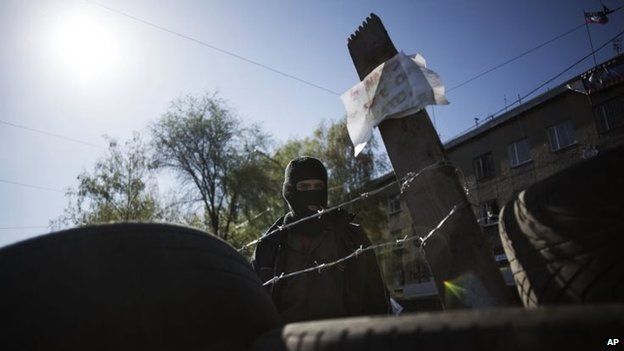Ukraine crisis: West faces election nightmare
- Published

As the days pass without an overt, large-scale, Russian military intervention in eastern Ukraine, Western leaders are focusing increasingly on another nightmare scenario - that elections planned for 25 May will not be able to take place.
The nervousness about this possibility among US and EU politicians stems from a knowledge that despite their vocal support for the interim authorities in Ukraine, they are in fact, as Russian statements never cease to point out, an unelected group who seized power.
So, in his stern message on Thursday, US Secretary of State John Kerry said that Russia had "failed to postpone Ukraine's elections… failed to halt a legitimate political process", and that now, through the aid of heavily armed pro-Moscow groups, was engaged in "a full-throated effort to actively sabotage the democratic process through gross external intimidation".
Russian response
Evidently though, under current security conditions, polling would be extremely difficult in much of eastern Ukraine, and attempts to regain control through Kiev's "anti-terrorism operation" seem to promise little, but run great risks if they cause sufficient casualties to prompt the Russian army to cross the border.
And while the Kremlin might calculate that such an invasion would finally stir the US and EU to implement painful economic sanctions, the possibility of using Russian paramilitary groups in Ukraine to disrupt the elections offers a less risky method of leverage.
On Friday, Russian Foreign Minister Sergei Lavrov responded to Mr Kerry by saying "Russia will act solidly to de-escalate the Ukrainian conflict on the basis of the agreement reached last week in Geneva".
That deal, signed by the US, EU, Ukraine and Russia, interestingly did not commit the parties to supporting the 25 May elections or even, more generally, to a speedy return to democratic government.
Instead, the brief Geneva text referred to "a broad national dialogue, with outreach to all of Ukraine's regions and political constituencies".
At the time, Mr Lavrov hinted that such a process, intended to address the demands of Russian communities in eastern Ukraine for guaranteed rights and a federal position within the country, could start ahead of the proposed 25 May poll, even if it did not produce a new solution until after it.
Limbo land
That statement, at a press conference in Geneva, was one of the very few times in this crisis that any senior Russian official has said anything that could be considered supportive of the planned vote.
Western officials argue that this is because the Kremlin prefers keeping the Kiev authorities in a limbo land, bereft of democratic legitimacy, while it negotiates, via the constitutional dialogue touted in the Geneva text, ways for Russian activists in eastern Ukraine to gain a veto over future moves closer to the EU or Nato.
For the interim government in Kiev, led by Arseny Yatsenyuk, it is vital that the planned vote takes place - not least because continued international bail-outs are contingent on a swift move back to elected rule.
Olga Aivazovska, from OPORA, a Ukrainian civil society group, argues that the elections must go ahead but that they may necessitate "a sober assessment… on the percentage of territories that won't be able to hold elections in a civilised fashion".
Weapon for Kiev
She acknowledges that if certain places aren't able to join in, "it could become a source of political debate and manipulation".
Pressing ahead with the vote thus becomes a weapon in the hands of the Kiev government, and disrupting it on the widest possible scale the favoured tactic of its die-hard critics.
And this provides a subtext for possible military action too - either that being currently undertaken by Mr Yatsenyuk's government against pro-Moscow elements who might block voting in the east, or indeed by the arrival of a substantial Russian military force in those areas that could prevent voting across a broad swathe of Ukraine.